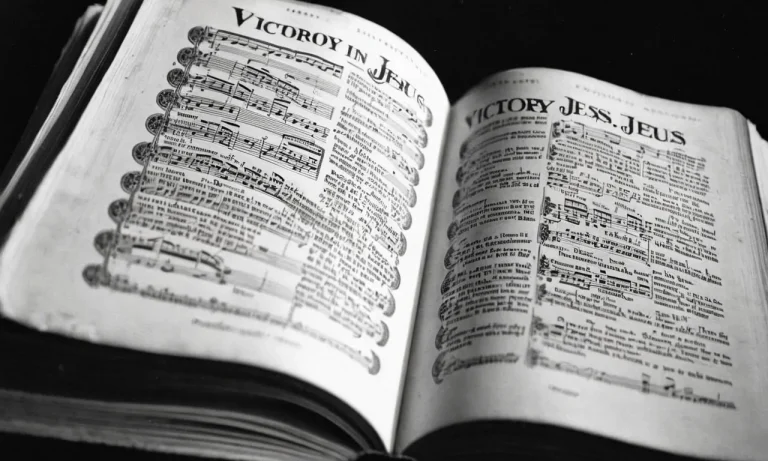What Is Sozo In The Bible? A Complete Explanation
The concept of sozo in the Bible is an intriguing one that sparks much discussion among Christians. At its core, understanding sozo requires digging into the original Greek meaning of the word. If you’re short on time, here’s a quick answer to your question:
In this comprehensive guide, we will unpack the meaning of sozo step-by-step.
You’ll learn about the Greek origin and definition of sozo, how it’s used throughout the New Testament, the role of sozo in spiritual salvation, and what sozo means for emotional and physical healing and deliverance.
By the end, you’ll have a full understanding of this multi-layered biblical concept.
The Greek Origin and Definition of Sozo
The Greek Word Behind Sozo
The Greek word behind “sozo” is σῴζω (sōzō). This word has a few different meanings in Greek:
- To save or deliver from danger
- To heal, make whole, or cure from disease
- To preserve or keep from corruption
In the New Testament, sōzō is often translated as “save,” carrying meanings of deliverance and preservation. It is used extensively in reference to salvation from sin through Christ.
The Breadth of Meaning in Greek
Because sōzō has a broad semantic range in Greek, it can express many different facets of salvation:
- Being forgiven and spared from God’s wrath (Romans 5:9)
- Being healed physically (Matthew 9:21-22)
- Being delivered from danger (Acts 27:20, 31)
Sōzō was a perfect word for the early Christian writers to describe the fullness of salvation in Christ.
Through faith in Jesus, people could be rescued from sin and death, healed of sickness, and preserved for eternal life.
The rich layers of meaning in sōzō help explain its widespread usage. Of the 49 New Testament occurrences, Jesus Christ is the subject over half the time. He came to “seek and to save the lost” (Luke 19:10).
How Sozo is Used in the New Testament
Salvation from Sin
The Greek word sozo is used extensively in the New Testament for salvation from sin. When people repented and believed in Jesus Christ as their Lord and Savior, they experienced sozo, being saved from the penalty of sin (Romans 10:9-10).
This salvation is by grace alone through faith alone in Christ alone (Ephesians 2:8-9).
Jesus is the only way to be reconciled with God and receive eternal life (John 14:6; Acts 4:12). What an amazing gift of God’s love and mercy!
Healing and Restoration
Sozo is also used for physical healing and deliverance from demonic oppression. There are many examples of Jesus healing the sick (Matthew 9:21-22; Mark 5:34) and casting out demons (Matthew 8:16; Luke 8:36) using the word sozo.
Even after His resurrection and ascension, His disciples continued healing the sick and demonized in Jesus’ name (Acts 3:1-10, 16; 16:16-18).
God’s power restored people to wholeness. What awesome displays of God’s kindness and compassion!
In addition, sozo referred to restoration of relationships. Jesus came to seek and save the lost (Luke 19:10).
Through His death and resurrection, Jesus reconciled and redeemed broken people to God and each other (2 Corinthians 5:16-21; Colossians 1:19-23).
There are stories of sozo bringing renewal and revival to families and churches (Acts 11:14; 1 Corinthians 1:18). What beautiful pictures of God’s love bringing reconciliation and restoration!
Deliverance and Rescue
The New Testament contains accounts of sozo as deliverance from danger and rescue from harm. Jesus calmed the storm to save His disciples from drowning (Matthew 8:25).
Peter was delivered from prison by an angel (Acts 12:11). Paul was spared from death a number of times (2 Corinthians 1:10).
What striking reminders of God’s protection and care for His people! Even when believers faced persecution and martyrdom, their souls were delivered unto eternal life (2 Timothy 4:18). What comfort knowing God preserves His children!
Sozo and Spiritual Salvation
Saved from Sin and Death
According to the Bible, all human beings are born with a sinful nature and are enslaved to sin (Romans 3:23). This leads to spiritual death and separation from God (Romans 6:23).
When someone puts their faith in Jesus Christ, they experience salvation (sozo) and are saved from the penalty of sin, which is eternal death and separation from God (John 3:16).
At the moment of salvation, the person’s sins are forgiven, and they pass from spiritual death into spiritual life (John 5:24). The apostle Paul describes this transformation as being “alive to God in Christ Jesus” (Romans 6:11).
Salvation rescues people from the domain of darkness and transfers them into the kingdom of light (Colossians 1:13).
Brought into Right Relationship with God
In addition to being saved from sin and death, salvation also brings people into a right relationship with God. Sin creates hostility and enmity between God and man (Romans 8:7).
However, when someone puts their trust in Christ for salvation, they are reconciled to God and adopted as His child (Romans 5:10, Galatians 4:5).
Where there was once alienation, there is now intimate fellowship and communion with God. The believer becomes a new creation in Christ (2 Corinthians 5:17) and is given direct access to the throne of grace (Hebrews 4:16).
This restored relationship with the Father is possible because of Christ’s atoning work on the cross. Jesus took the punishment for sin so that sinners could be brought back into fellowship with a holy God (Romans 3:25).

Made Part of God’s Kingdom
The Bible teaches that all who receive salvation are transferred from the kingdom of darkness into the kingdom of God’s Son (Colossians 1:13). They become fellow citizens with the saints and members of God’s household (Ephesians 2:19).
Whereas before they were under the dominion of Satan and sin, now they yielded to the lordship of Jesus Christ.
Believers are described as being delivered from the power of darkness and conveyed into the kingdom of the Son God loves (1 Colossians 1:13).
This kingdom is characterized by righteousness, peace, and joy in the Holy Spirit (Romans 14:17). The Holy Spirit takes residence in the believer’s heart and applies the liberating power of the kingdom to their lives from the inside out (Romans 8:9-11).
Salvation inaugurates the process of renewal and restoration in a person’s life as they grow to reflect God’s glory and character.
The full experience of the kingdom will be realized when Christ returns and establishes the new heavens and new earth (2 Peter 3:13).
Sozo as Healing and Deliverance
Physical Healing and Health
The Greek word “sozo” refers to deliverance, preservation, healing and wholeness. When we think of sozo as physical healing, we are reminded that God desires shalom and wellbeing for our bodies.
Throughout the Bible, we see stories of Jesus miraculously healing the sick – restoring sight to the blind, making the lame walk, cleansing lepers, and bringing the dead back to life.
These acts of power demonstrated Christ’s authority and compassion. By taking our infirmities and diseases upon himself at the cross, Jesus purchased divine health and healing for us (Isaiah 53:5).
Divine healing is a benefit of Christ’s atonement that we can access through faith and prayer. When we lay hands on the sick and pray for their physical restoration in Jesus’ name, we are activating the power of the Holy Spirit to bring sozo healing.
Inner Emotional Healing
Our inner emotional lives and past experiences deeply impact our wellbeing. Many people need Sozo healing for traumas, abuse, grief, depression, anxiety and inner turmoil.
These issues often manifest physically through chronic fatigue, headaches, sleep problems and digestive issues.
That’s why it’s essential we receive prayer for emotional sozo healing.
Through compassionate ministry and the love of God, deep emotional wounds find healing. As we open our hearts to Jesus in vulnerability and humility, His unconditional love brings tender restoration.
The Holy Spirit gives us renewed strength, joy and peace as we receive deep inner healing. Christian counseling coupled with prayer ministry can facilitate emotional Sozo healing beautifully.
Deliverance from Harm and Danger
God promises to be our rock, fortress and deliverer (Psalm 18:2). Through faith in Christ, we have authority over satanic influence and demonic oppression.
As believers, we can live free from fear, for “God has not given us a spirit of fear but of power, love and a sound mind” (2 Timothy 1:7).
Yet spiritual battles are real. Putting on the full armor of God enables us to stand firm against evil attacks (Ephesians 6:10-18).
Through prayer and spiritual warfare, God brings deliverance from harm and danger. As we resist the devil, he must flee! (James 4:7).
By praying for hedge protection and proclaiming God’s promises, we access Sozo deliverance.
Jesus modeled delivering people from demonic oppression. As the seventy disciples returned to Jesus with joy saying, “Lord, even the demons submit to us in Your name,” Jesus responded, “I have given you authority to tread on snakes and scorpions and overcome all the power of the enemy” (Luke 10:17-19).
We have this same authority as believers today. Through Sozo deliverance prayer, we can walk in spiritual freedom and victory.
Conclusion
In summary, the concept of sozo in the Bible is rich and multidimensional. At its core, it communicates the power of God to save, heal, deliver, and restore on every level.
Unpacking the original Greek meaning opens up the fullness of what Jesus came to do in our lives through His sacrificial death on the cross.
As we embrace the sozo we have in Him, we can experience transformation spiritually, physically, and emotionally as we walk in intimacy with God.








